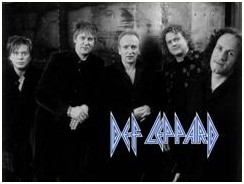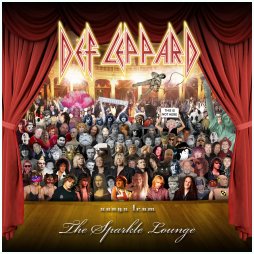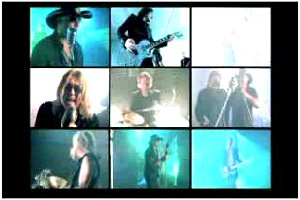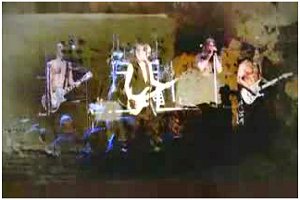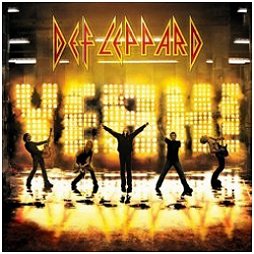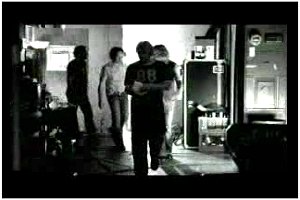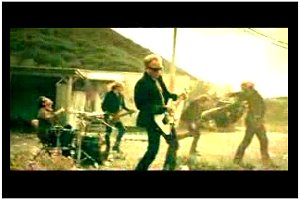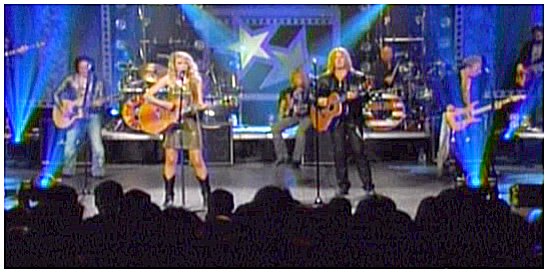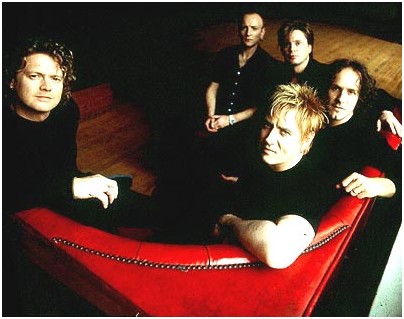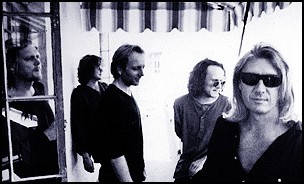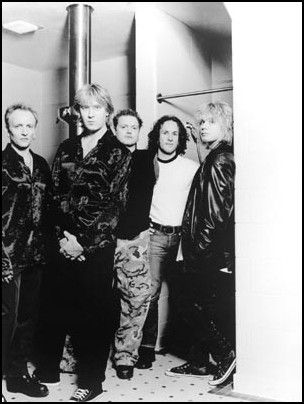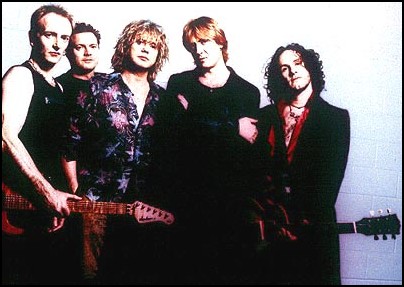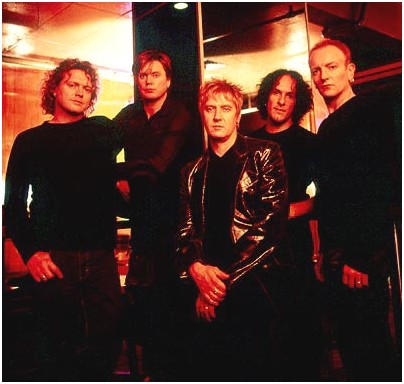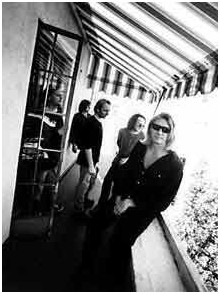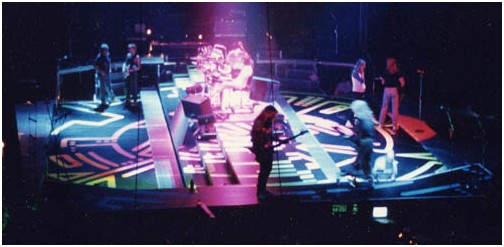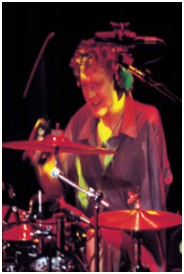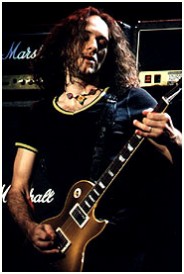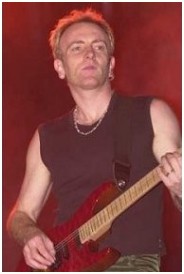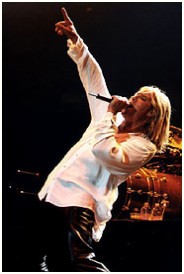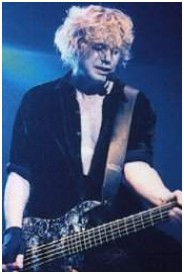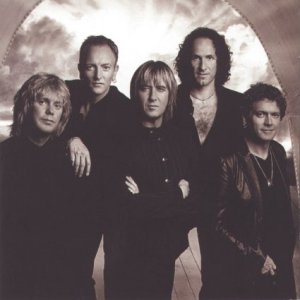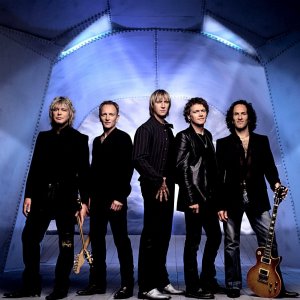|
Despite an average age of only eighteen, Def Leppard burst onto the heavy metal scene back in 1980 like a group of seasoned veterans. "This band frequently transcends the mundane through sheer musical energy and playing ability," wrote Jim Schwartz in Guitar Player. In a genre known for clichéd riffs and monotonous beats, these heavy metal giants have created a pop/metal sound of their own while becoming one of the top-selling groups in rock and roll.
The roots of Def Leppard are to be found in the band Atomic Mass, which featured bassist Rick Savage, guitarist Pete Willis and drummer Tony Kenning. Soon, vocalist Joe Elliott came into the picture bringing along with him the name Deaf Leopard, which was then changed to the now familiar mis-spelling. Second guitarist, Steve Clark, was recruited in time for the first set of gigs in the summer of 1978, before Kenning was replaced by Frank Noon. This line-up was responsible for the first Def Leppard recording - the three-track single 'Getcha Rocks Off,' released in a limited edition of just 1000 copies on the band's own Bludgeon Riffola label.
In 1979, the line-up became complete when Rick Allen signed on as the band's drummer. Radio airplay and music press interest led to the band signing with Phonogram, which handled the debut album, 'On Through The Night' (1980). Despite its Top 20 success, the press felt its overly polished sound was a deliberate ploy for American success, and the accompanying single, "Hello America," appeared to support that charge. Still, they toured the US to encouraging response, although British reactions were poor at the 1980 Reading Festival.
Back in the studio, they began a fruitful and long-lasting partnership with producer Robert 'Mutt' Lange on 'High 'n' Dry' (1981). It was a vast improvement on its predecessor, but its British success was once again overshadowed at the time by its US sales. Another personnel change was inevitable, as Pete Willis's drinking was becoming increasingly problematic for the band. In 1982, he was finally replaced by guitarist, Phil Collen.
'Pyromania' (1983) was the first real demonstration of both Def Leppard's songwriting ability and Lange's meticulous production. It was released to cautious praise in Britain, but in America it sold over seven million copies and spawned several major hits, "Foolin'" (No. 28), "Rock of Ages" (No. 16) and "Photograph" (No. 12). Def Leppard had won over America and Britain was finally starting to slowly take notice, but cruel fortune was ready to bring the band crashing back to earth.
On New Year's Eve 1984, Rick Allen was involved in a serious car accident near Sheffield which resulted in the loss of his left arm. Despite his bandmates' -- not to mention the public's -- initial skepticism, Allen actually made learning to drum through his handicap part of his recovery. Amazingly, the drummer refused to be beaten and set about working out how he could continue in the band. By April of 1985, he was playing a specially designed drum kit that allowed him to trigger rolls and fills with his feet. The band's faith in him payed off as he was able to resume his duties for the recording of the next album, which took three years and cost a million pounds to make. 'Hysteria' (1987) proved to be an instant rock classic, and marked a spectacular breakthrough in the band's homeland. Its first spin-off single release, "Animal," hit the UK Top 10, while the LP was an immediate chart-topper and the supporting tour sold out everywhere the band performed.
Stateside, Def Leppard became the first band ever to have successive albums sell over seven million copies and the single, 'Hysteria,' went all the way to No. 10 on the US charts. This US chart success was followed by "Pour Some Sugar on Me" (No. 2) and "Love Bites," the band's first No. 1 and the first power ballad to go to the top of the charts. (Neither fact was lost on other metal bands: Poison released "Every Rose Has Its Thorn" to similar success that winter; by summer 1989 you couldn't spray Aquanet in any direction without hitting a former bad boy singing earnestly about love).
With worldwide sales of 'Hysteria' topping twenty-four million (including a mind-numbing 13 million in America alone), the band was finally enjoying success at home, too. Their set at the October '86 Monsters of Rock show at Castle Donnington, England had been a highlight of the festival and the new album debuted at No. 1 in the U.K. In all, 'Hysteria' would yield seven hit singles, a number previously reached only by Bruce Springsteen and Michael Jackson.
On September 1989, Def Leppard played the MTV Music Video Awards in Universal City, California. Though no one in the band knew it yet, it would be Steve Clark's last show with the group. Clark's alcohol problems worsened steadily through the remainder of 1989 and into 1990. In September of 1990, Def Leppard asked him to leave for six months to sort himself out. In January of '91, he was found dead in his London apartment after mixing alcohol and prescription pain relievers. He was 30 years old.
The remaining quartet threw themselves into recording 'Adrenalize' with Phil Collen playing all the guitar parts on the new album. 'Adrenalize' proved to be much more polished and likable commercial rock. As a result, the record debuted at No. 1 on both the U.K. and U.S. charts in April 1992, and the band appeared on the cover of Rolling Stone for the first time. Vivian Campbell, formerly of Dio and Whitesnake, was recruited as Leppard's second guitarist for the 'Adrenalize' tours. The world tour was yet another triumph, including an emotional homecoming at Sheffield's Don Valley Stadium, by which time 'Adrenalize' had sold over six million copies.
The usual epic wait for a new album was made bearable by a fine stopgap release: 'Retro-Active' (1993), a fine collection of B-sides, remixes and unreleased studio material, wrapping up Steve Clark's time in the band. By 1994, when Def Leppard gathered in Spain to record their seventh album, the band decided to take some musical chances. The group decided to forgo Lange's services, and the recordings that would become 'Slang' were made with an ear to the alternative music dominating the airwaves in the wake of the success of Nirvana, the Smashing Pumpkins, and Nine Inch Nails. As recording proceeded through 1995, the group decided to release a greatest-hits album, 'Vault,' to commemorate 15 years of unqualified success. To promote the album's release, they played three concerts in three cities on three continents on the same day: Tangiers, London, and Vancouver. Finally, in 1996, 'Slang' appeared - a bold, contemporary release, combining the classic Def Leppard sound with the rootsiness of 'Retro-Active.' It was greeted with acclaim from fans and critics alike, proving again that the band's renowned perfectionism has always been worth waiting for.
'Euphoria,' released in 1999, had everything a classic Def Leppard album required: soaring harmonies, catchy choruses, and hooks, hooks, hooks. It was the finishing touch to the trilogy started by 'Pyromania' and 'Hysteria' and the band continued to tour to support the new release.
In June of 2000, "NOW," the first single from the band's tenth album, was released. The album 'X' (as in the Roman numeral for 10), was released in July. Before the 'X' tour officially starts, the band played a number of shows in the UK, including one in Leeds, attended by Queen Elizabeth. In September, the world tour officially kicked off.
For the biggest part of 2003, the band toured around the world. Apart from shows in the US, Canada, Japan and the UK, the 'X' tour also took the band to places they hadn't visited in a very long time (such as Germany and Poland) -- or even never before (such as Latvia, Lithouania and Russia). After 151 shows, the 'X' tour comes to an end in Moscow.
Most of 2004 was spent on recording a new album, consisting of cover versions of the band's favorite songs from their youth. By the end of the year, an updated version of the 1995 Greatest Hits release 'Vault' was released on CD and DVD in most of the world (excluding North America): 'Best Of Def Leppard.' The album contains one 'new' song; "Waterloo Sunset," originally recorded by the Kinks, as a preview of the upcoming covers album.
In May of 2005, the North American version of the updated Greatest Hits compilation was released: 'Rock Of Ages - The Definite Collection' has new artwork, a slightly different track listing and, instead of "Waterloo Sunset," another preview of the covers album: Def Leppard's version of Badfinger's "No Matter What." In June, a co-headline tour with Bryan Adams kicked off in the US, and on July 2, Def Leppard was part of the LIVE 8 festival in Philadelphia, where they performed in front of over 1,000,000 people.
Though not the commercial blockbuster they were when the decade began, Def Leppard has taken on comfortable elder-statesmen status. The band still tours frequently, still sells out venues in North America and around the world, and still nurtures one of the most rabid and vocal fan bases in rock. Their 1998 Behind the Music special and 1999 Storytellers appearance showcased a mellower, contented Leppard -- no longer the hungry young lads from a Northern steel town, but with more than a touch of the old pyromania.
Despite their many ups and downs, Def Leppard remains one of the most biggest and best-loved bands in the rock industry, a fact that has just recently been illustrated by their induction into the Rock'n'Roll Walk of Fame. Make no mistake, though they have achieved more than what most bands do in their entire life span, the life of Def Leppard is far from over. The best is yet to come!
|

